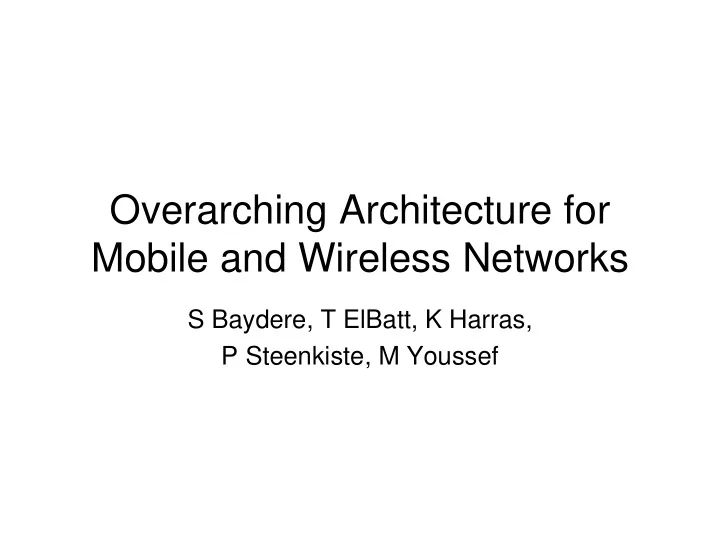

Overarching Architecture for Mobile and Wireless Networks S Baydere, T ElBatt, K Harras, P Steenkiste, M Youssef
Challenged Networks • Mobile, frequently disconnected, users • DTNs • Multi-modal WSNs serving diverse apps – from temp. to video sensors • Mobile devices with multiple interfaces • Connectivity for underserved communities: still a major issue • Vehicular networks
Common Characteristics • Unpredictable connectivity, but … • … lots of diversity: data, nodes, links, performance criteria, … • Current Solutions – Status Quo – Diverse, point solutions – Communication embedded in application – Ad hoc solutions to critical problems, e.g. security, energy-efficiency, incentives, etc. – Poorly integrated in today’s “Internet”
The Opportunity: Overarching Architecture • Need for an overarching networking architecture – Seamless transition between operating regimes – Leverage Content-centric and in-network services – Leverage infrastructure-less networking paradigms, e.g., multi-hop, DTNs – Leverage heterogeneous wireless access technologies • Architecture must be adaptable to the context/scenario – Performance metrics will differ – Diverse resource constraints – Security requirements are different – Adaptable both within and across regimes • (Re)negotiate with application on nature of service
Research Issues • Appropriate evaluation metrics? – Mapping appl metrics onto network metrics • Opportunistic Communication – Network service driven preferred • Resource Sharing and Management • Incentive schemes for cooperation • Energy-efficient computing and networking • Adaptable to multiple contexts • Adaptable to multiple application models – In-network data aggregation, security, .. • How much is reusable across network types?
Security and Privacy • Security and Privacy – Trust – Provable/quantifiable security – Impact on other metrics, e.g. throughput, energy, .. • Not all applications may be appropriate in all contexts – Lack of trust, e.g. in forwarding nodes, ..
Recommend
More recommend